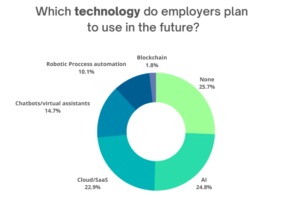
Payroll has evolved and gone global in the past few years. Since many companies adopted a hybrid work model post the pandemic, payroll management underwent a significant transformation. Traditional payroll systems are no longer viable for managing a firm’s global employees, pushing HR personnel and UK payroll providers to look for a more feasible solution.
The rise of cloud payroll has already given a remarkable boost to the industry. It has made payroll more accurate and accessible, eliminating manual paperwork, potential errors, and security risks. But there’s more to HR and payroll management than just processing employee salaries.
For instance, HR departments today do more than just recruitment and payroll. They onboard employees, manage their information and reporting, ensure professional development through training and courses, and try to retain their best talent.
Payroll, in itself, is a highly collaborative and cumbersome task involving sound technical and legislative knowledge. A recent study by PayFit revealed that 37% of UK employers report manual payroll tasks as stressful for them and their teams. Accounting firms are no exception to this.
This is where organisations need an all-in-one solution that solves their payroll woes and helps with HR management, irrespective of whether they manage the function in-house or outsource payroll services.
Artificial Intelligence (AI) is a groundbreaking technology aiding companies to battle modern-day business challenges quickly and efficiently. Since HR and payroll are among the most crucial departments in an organisation, many businesses are experimenting with using AI technology in payroll.
Artificial Intelligence, or AI, is a cutting-edge technology that uses machine-based intelligence to perceive, infer, and analyse information. It helps businesses automate crucial processes, making them more efficient and potentially error-free.
Manual payroll processes are mundane, slow, and highly prone to error. Even with legacy payroll systems, companies depend on HR professionals and administrators to get the job done.
AI in payroll processing, on the other hand, makes it quicker, easier, and more accurate by using machine intelligence to perform complex calculations, implement compliance, and manage more significant tasks, such as a deep analysis of trends and data.
Considering their rising scope and proven benefits, many businesses, accounting firms, and payroll outsourcing providers are making the shift from traditional payroll methods to evolving technologies such as cloud computing, Robotic Process Automation (RPA), and AI. Therefore, AI is one of the crucial payroll trends for accountants to look out for.
A Ceridian report on payroll technology in the UK gave a peek into the rising scope and demand for new technologies. Of all the payroll experts polled, 72% revealed they planned to use new technologies such as Blockchain, RPA, and AI in the coming years.
Among the most voted technologies, AI and cloud/SaaS were the most popular, with more than half (52%) of the firms surveyed planning to explore them.

With changing times, the once-resistant accounting industry is opening up to innovations such as automation. Catalysed by the pandemic, technology and digitalisation are evidently the future of payroll, making it necessary for UK payroll service providers to be well-versed in it.
Beyond payroll, HR management is also challenging in today’s world. Apart from hiring new talent and paying their salaries, the HR function involves managing existing employees and ensuring their development within an organisation. Since companies spend considerable time and money onboarding and training employees, retaining them for a long time is also important.
AI can be instrumental in helping companies manage their HR operations smoothly. Not only does it facilitate virtual collaboration and process automation, but it also makes use of predictive analysis to understand employee behaviour and ensure their growth.
Businesses that have already adopted AI in HR and payroll have reported a significant boost in process efficiency. Some of the benefits of AI, as reported by these firms, include:
Considering the complexity of modern-day payroll, automation has become essential. It not only simplifies the process for firms but also makes it quick and error-free. Moreover, payroll administrators can save a lot of time that is otherwise spent doing complex calculations and focus on higher-value tasks crucial to a company’s growth.
Compliance is the most difficult and mundane aspect of payroll. Many accountants refrain from adding payroll to their portfolio or outsource payroll services to a third party to escape the compliance part of it. But with AI, this aspect is well taken care of.
AI helps automate complex legislation and payroll compliance so that HR professionals do not have to handle it manually. Moreover, it can assess trends and predict changes, making compliance easier.
Employers are expected to report to HMRC post every payroll cycle. This report includes crucial information such as salary and tax information, employer and employee contributions to schemes, pension deductions, special grants, etc. Any delay or failure to report this information may invite hefty penalties from HMRC.
AI is crucial in analysing payment trends and historical data to automate the reporting process. For instance, it helps create a system wherein the required data is automatically shared with HMRC, eliminating manual intervention and thus reducing the scope for delay and errors.
Traditionally, payroll administrators had no way to analyse trends and employee behaviour as it would take several days, along with the risk of inefficiencies. Using AI and machine learning, HR professionals can now employ predictive analysis to understand and implement the latest trends and make more informed decisions to grow their firms.
Post the pandemic, managing remote employees has been challenging, especially for firms with a global workforce. Amid the Great Resignation and the current hiring freeze, it is vital that organisations retain their best employees by facilitating professional development.
This is where AI can play a crucial role. HR professionals can understand employee behaviour, skill sets, and requirements through predictive analysis. Based on this information, companies can refer employees for training and development programs, thus ensuring their growth and career progression.
Owing to its complexity, many growing businesses hire an external accounting firm to manage their payroll. Although accounting firms have the expertise to manage global payroll, they most commonly struggle with a lack of staff, which affects productivity and efficiency in the long run.
New technologies such as cloud computing, AI, and automation play a vital role in making complex processes quicker and easier. With AI, accounting firms can manage clients’ payroll and overall HR operations, thus delivering a complete package of services.
Since the demand for AI and similar technologies is rising, expertise in these solutions will become a prime parameter for clients to choose accounting firms. Therefore, accountants must be well-versed in the latest technology or outsource payroll to a tech-efficient outsourcing provider like QXAS.
To learn more about the importance of the latest technology and its benefits when combined with payroll services outsourcing, speak to one of our outsourcing advisors today. Reach out to us at [email protected] or call us at +44 208-146-0808 to book a free consultation.
Priya is a seasoned payroll professional with over 13 years of extensive experience in UK and Ireland payroll. She specialises in delivering accurate, compliant, and efficient payroll solutions that support business growth while ensuring employee satisfaction.
Unauthorized copying or plagiarism of our content is a violation of intellectual property rights. We take such matters seriously and will pursue legal action to protect our original work. Anyone found engaging in such activities will be held accountable under applicable laws.
Explore outsourcing solutions, request a free trial or discuss your practice’s needs with our expert consultants.